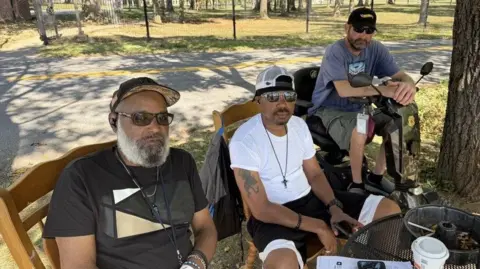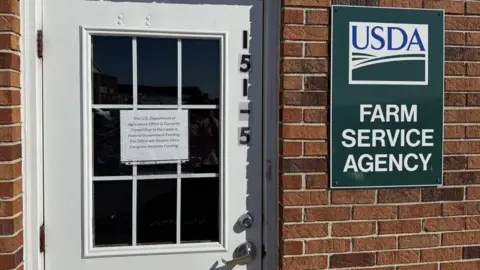Ana Faguyin Martinsburg, West Virginia
 BBC
BBCIt’s been three months since Jonathan Giba moved into temporary housing for homeless veterans inside a hospital for former members of the US military in West Virginia.
He has been waiting for medical and dental consultations, after medications he was previously prescribed left him without teeth and unable to walk. Now, with the government shut down, he is preparing to wait even longer.
He calls it “political bs”. The US Veterans Affairs (VA) hospital where Mr Giba is staying in Martinsburg, West Virginia, is still providing medical care, but the VA stopped other programs that help veterans find jobs and transition from military life.
“The shutdown is a waste of time, and it hurts everyone in the meantime,” the Army veteran says.
Martinsburg is an American town particularly fixed to feel the impacts of the US government shutdown.
A city of nearly 20,000 people some 85 miles (136km) outside of Washington DC, federal agencies employ upwards of 3,300 people in the area, between the veterans’ hospital, an Internal Revenue Service (IRS) processing facility and an agricultural assistance office.
Another thousand or so federal workers commute to the nation’s capital each day from the Amtrak station in Martinsburg’s centre.
This is Trump country, where 67% voted for the president in 2024 and a fierce independence undergirds something of a make-it-work mindset.
Because of the government shutdown, a nearby community event – the Freedom’s Run Race Series – changed its route from trails near a federal Civil War battlefield site, but otherwise went on as planned. Harper’s Ferry, a national park and nearby tourist draw, has been kept open with state money.
But the political bickering in Washington and perceived lack of concern about everyday Americans are not far from people’s minds. And they worry about what’s coming as the shutdown drags on.
On an unseasonably warm Monday nearly six days after the US government shut down, Mr Giba sits underneath the shade of a large tree chain-smoking cigarettes with fellow veterans.
One of them, Troy Williams, says politics is hurting average Americans. “This isn’t a Democrat or Republican issue,” he says, “this is a why aren’t they working on a solution issue.”
Air Force veteran Marcellus Brothers is concerned about what’s ahead. “We’re in limbo, it’s scary.”
Republicans and Democrats have been deadlocked over government funding since it ran out on 1 October, and much of the government shut down, placing more than 700,000 people on unpaid leave. Some 200,000 other workers deemed “essential” are working without pay as the political standoff drags on.
Politicians in Washington have pointed fingers in the direction of the opposing party. On Friday, the White House began laying off thousands of federal employees.
In a state already hit by job cuts from the Trump administration’s efforts to scale back the federal workforce, the shutdown threatens even steeper losses, Kelly Allen, the executive director of the West Virginia Center on Budget and Policy warns.
“We have more federal government employees than coal miners in West Virginia,” she says. “Of course those jobs are well paying, come with good benefits and in a state with not a whole lot of good paying jobs those are really important.”
Tina Hissam, a small business employee in the area, has seen the impact of government shutdowns on her neighbours first hand.
“It hurts the small businesses, they may cancel services, they may not shop locally,” she says of federal workers. “The government shutdown has a huge impact and it’s really scary, I just pray that it all goes away.”
Already, a United States Department of Agriculture (USDA) service centre – which serves the seven surrounding counties – has shut its door.
The office – responsible for assisting farmers, ranchers and landowners with tasks like applying for farm loans and disaster assistance – will remain closed until the government reopens.
And on Wednesday, the IRS furloughed 34,000 workers, so the service centre in Martinsburg may soon be affected.
History has shown that as shutdowns go on, more services are cut or shuttered because of a lack of funding.

West Virginia Senator Shelley Moore Capito has so far remained unbowed despite the potential impact on areas she represents like Martinsburg. She has voted with fellow Republicans to provide government funding without healthcare subsidies that Democrats want. Both sides’ proposals have repeatedly failed.
In a local op-ed, Moore Capito noted West Virginia has the third-highest number of federal employees per capita in the country, but blamed Democrats’ intransigence.
“These are our neighbours and friends – people who keep our miners safe, process veterans’ benefits, secure our borders, and keep drugs out of our communities. They’re now facing uncertainty about their pay cheques through no fault of their own.”
When the first cheques since the shutdown arrive – or don’t – on Friday that impact may finally hit.
In previous shutdowns, federal workers who went without pay were given back pay, but it remains unclear if that will be the case this time around.
“The economic loss could have wide-ranging consequences on local communities, businesses and households. It could cause long-term damage to local economies,” resident Mark Mulligan says.
“West Virginia is a poor state and dependent on federal jobs and handouts. The pain to the elderly, the disabled and to children could be catastrophic. “
Source link

